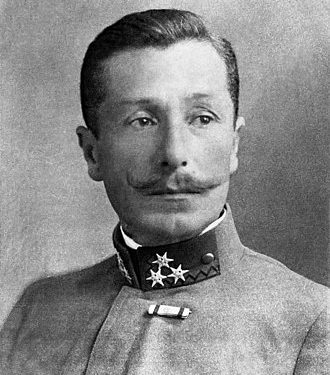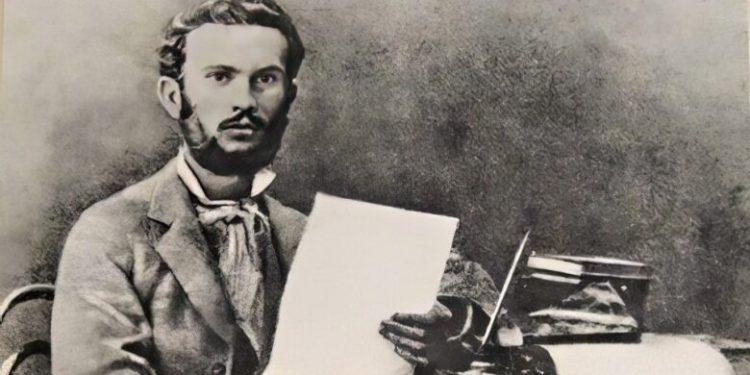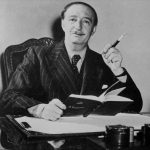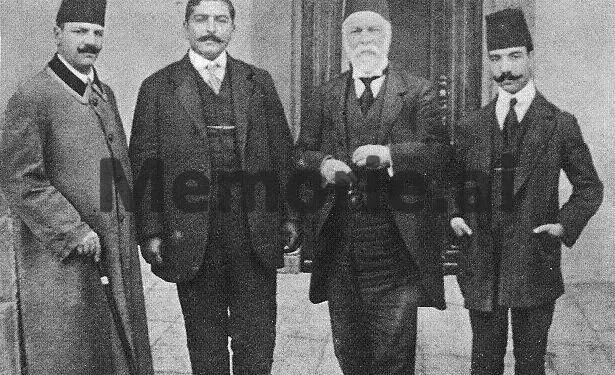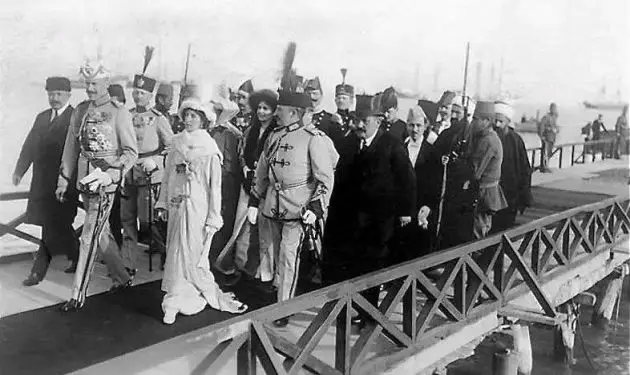Memorie.al / A nation without history cannot exist! The history of our nation distinguishes us from other nations, constituting undeniable special values as a nationality, highlighting the persistent and defiant character of the Albanian, the titanic efforts to unify Albania, not to divide it by the appetites of the Great Powers, and the construction of the Albanian state with all the necessary institutions. Ervina Toptani, a researcher and a good connoisseur of the historical events of our people that have made an era, in an exclusive conversation for the newspaper “Dielli”, recounts the role of the Pan-Albanian Federation “Vatra”, with its personalities, together with the USA, in relation to the Albanian national issue.
Prominent personalities both inside and outside the country created their lobbies to prevent the division of the country, and then united in a single society, for a common goal. During the conversation, Toptani will also talk about the role of Zog in building the Albanian state. She emphasizes that his role was indisputable, but he could have done much more.
– Each part of history, spread over different times, has its own special importance to discuss and, taken as a whole, constitutes in itself a historical value for the nation. But I would like our conversation to start with Albanian nationalism and the role of the Albanian diaspora. What period of time would you single out when Albanian nationalism reached its peak?
I think that the Albanian diaspora has begun to develop and organize since the 19th century, especially after its second half. The organized diaspora, I believe, begins with the Italian-Albanians of Southern Italy, with their schools of thought and especially with their work and efforts in favor of the Albanian national idea. Excellent people like De Rada etc., were the pioneers of national ideas, from which other patriots were inspired further. We cannot fail to mention the Albanian groups of Bucharest and Egypt, who provided much assistance, including the contribution related to the writing of the Albanian language. Another pioneer of Albanianism is Said Sermedin Toptani, whose work was continued by his sons, Refik and Murad Toptani, even at the beginning of the 20th century.
In the Albanian diaspora outside the national territories, most of the personalities who, for various reasons, did not have good relations with the Sublime Porte, or were punished by it, developed activities. Above all, I would like to single out Pashko Vasa, whom in an article of mine some time ago, I called the “Fichten of Albania”, for what he contributed to national thought with his efforts to raise awareness of European chancelleries about Albania and the need to form a unitary Albanian state in the Balkans (related to the efforts of patriots during the period of the League of Prizren). Meanwhile, the Albanian community of Istanbul with its political, linguistic and cultural committees was even more important.
Among them, we can mention figures like the Frashëri brothers, especially Sami Frashëri, who with his major work, on the idea of Albanian national impartiality “Albania what it was, what it is and what it will become”, can be called one of the founders of the Albanian political idea. Then come other great figures like Konica and Noli, etc., whose activity is related to the concrete political work for the formation of the Albanian state in 1912. But, having said that, I would see the nationalists of the time from two perspectives: those who lived far from their homeland and those who lived within Albanian territories. This had a positive side, because it gave everyone the opportunity to contribute to their country in many dimensions, even knowing that this brought about a clash of ideas in some cases and not always with beneficial results for the general issue.
Personally, I think that patriots with international dimensions were brilliant intellectuals of the time, well-known international figures, journalists, publishers, writers, etc., who gave everything trying to bring the experience of their lives in the Western world to the country of the ancestors, with numerous sacrifices and even losses. But, although these men represented brilliant minds, great abilities and extensive experiences, based on the democratic demands of the time, or had beautiful ideas and great desires for rapid and strong improvements in the internal life of the people and the new Albanian state, they almost did not know life inside Albania, the daily way of life of the people there, the experience of their experiences with the various problems they faced in the conditions of an abnormal politics. Therefore, unfortunately, beyond the desires and efforts of these figures, their success in patriotic activities can be considered relatively modest.
On the other hand, there were other Albanian patriotic figures from within the country, who, although sometimes not possessing the intellectual strength of their predecessors, possessed a perfect knowledge of the territory and the people, of the popular mentality, with knowledge of the customs and mentality of the Albanian of the time. These men also had a very important knowledge of the internal life of the Ottoman Empire and its institutions, which from time to time even managed to find the possibility of coordinating Albanian interests and needs with those of Istanbul.
– Within the framework of the great efforts of patriots and prominent personalities, for the construction and organization of the Albanian state, is there a period that you would single out as a success, but also a failure, of their struggle for an ethnically united Albania?
We cannot forget the great success achieved in August 1912, when Istanbul finally, after many efforts, recognized the Albanian national idea by accepting the principle of unifying the Albanian lands of the 4 vilayets, in a future entity with internal institutions, which also brought about the intervention of the Balkan powers, a situation that brought about the Ottoman defeat in the Balkan War and the fragmentation of our lands. I believe that the lack of coordination of intellectuals coming from Europe and the USA, with the internal Albanian personalities, perfect connoisseurs of life and our people, may be among the main causes of the failure of many efforts to build the Albanian state, which also brought about a series of movements and uprisings that did not allow the newly formed state in Tirana to progress peacefully.
– As you mentioned above, nationalism crossed borders by working hard for the Albanian cause even in foreign lands. Activists, prominent personalities such as Faik Konica and Fan Noli, lobbied strongly in the salons of the world, even as far away as America, for the non-disintegration of Albania, the democratization of the country, for the reduction of illiteracy, etc. We have the creation of Vatra in Boston, on April 28, 1912 in Boston, which had started meetings a year earlier, where it also lobbied strongly for the rights of Albanians around the world in the US Congress. What was the role of Noli, Konica, but also other personalities, in the Albanian issue?
The “Vatra” association is very important in our history, as it became the center in which Albanian immigrants, personalities from different fields or not, could seek forms of organization through it to give their support to our national issue. I think that beyond the contribution that many individuals made with their own forces, organized forms of contributions only increased as the strength and political prestige of the United States of America increased in the war that was taking place in Europe. Especially with the entry of the USA into the world war on the side of the Entente, when the Anglo-French clearly understood that without comprehensive American economic, industrial and military assistance, they would not be able to win against Germany, the role of the Homeland also increased, in coordination with the official policy of Washington.
The major problem of the Albanian elite of the time, as well as later in World War II, was its ideological division: with the camp of those who believed that Albania would benefit geopolitically if the Austro-Germans won the war, towards which many Albanians of the time also felt a kind of moral debt to the policies of Vienna, without which Albania would hardly have been formed as a state in the Balkans, and, the second camp, those who thought that victory would lean towards the Anglo-French, allies of the Russians, Greeks and Serbs, which also created doubts in many of the personalities of the time. The camps also had strong opposition at times, since it was difficult to unite those who suffered to create the unitary Albanian state with those who suffered the policies of the Russians – French in favor of their Serbian and Greek clients, who sought to expand as much as possible at the expense of Albanian lands.
With the entry of America into the conflict on the side of the Entente, especially with the publication of President Wilson’s famous 14 points, Albanians began to support the ideas coming from the USA and to hope for the benevolence of Washington, and consequently to rely more on patriots across the Atlantic. From this moment, the important role of figures such as the Konica brothers and Fan Noli, the builder of the autocephaly of the Albanian Orthodox Church, who tried in every way to bring new ideas to our country, to influence the democratization of internal life in Albania and the political ideas of state formation and especially in the re-creation of the independent state during the Peace Conference in Paris, amidst the numerous difficulties of the politics of the time, becomes even more evident.
I think that Noli’s meetings with President Wilson in Washington also influenced his subsequent decisions to stop the policies of other Entente allies with the development of their personal ideas and policies for the division of Albania, with its peak in the early 1920s, when the US President influenced the cancellation of the agreement reached to divide our country.
– Since we are in the period of the Ottoman occupation…! A document released from the Turkish archives shows that during the Ottoman occupation, the Christian religion was allowed, the use of the Albanian language, schools were established, the country experienced economic prosperity, etc. How much would you defend this document, based on the studies that have been conducted by historians, as far as you are aware? However, despite Turkey saying it out loud, they will remain invaders…?
The occupation by a foreign people always remains such, regardless of the name used, religion, ideas, interests, etc. The question is always whether you can cope with that situation or not, how you cope with it, the costs required, the possibility of meeting these costs, etc. I think that the Ottoman conquest can be divided into two or three larger periods, also related to their own history of military expansion and state formation. The first, coincides with the beginning of military conquests, under the Ottoman prince, until approximately the reign of Suleiman the Magnificent, or more generally in the 17th century.
This was a time of violent Ottoman conquests, when the empire possessed maximum power for expansion; then, until the second siege of Vienna, in the late 1600s, we have an era of stabilization of the empire, which no longer has major conquests and when the Ottoman efforts were more towards strengthening their state; After this date, the gradual decline of the Ottoman Empire began, until the “sick Bosphorus Wall”, when the old Ottoman Empire turned into a state “corpse”, awaiting a slow death.
– Many Albanians have held high leadership positions in the Sublime Porte. What were the relations of the Albanians with the Turks? What was their role in the Ottoman Empire?
Our ancestors were among the most favorite peoples for the Turks. Albanians are a people capable of adapting quickly and well, as we have shown in the last 30 years, where most of us have adapted perfectly wherever we have gone in Europe or America. Even with the Ottomans, our ancestors adapted well, even changing their religion when they were asked to do so. In particular, I would like to add something about the character of the Albanians, which I have also described in my first book, as part of the anthropological study of the Albanians and as a special feature of ours. Albanians love their freedom above all else. For freedom, Albanians have always been able to give what they held most dear, even the religion of their ancestors.
By doing so, they were able to save their lives by guaranteeing the continuity of existence to future generations, they were able to preserve their freedom and the continuation of their activity. But this also gave them the opportunity for excellent careers under the flags of the greatest empire of the time, at least when the Sublime Porte was on the rise. Let us not forget that from the Albanian womb, dozens of viziers and hundreds of pashas for the Ottomans have emerged in history, commanding the Turkish empire for long periods. And this not for reasons of sympathy, but for the merits of the Albanians themselves, who were strong and wise men, just like the eagles of their mountains.
Let us not forget that one of the last prime ministers of the Ottoman Empire was a son of the Vlora family, Ferid Pasha Vlora, or even the personal guards of the last sultans, were composed only of Albanians. As for religion, I am not surprised by the discovery of the document you show. It was the custom of the Ottoman Empire that people had a kind of freedom in their religious beliefs, although special taxes of a religious nature were also required of non-Muslims. I would like Albania to have always been a European and Western country, as we are trying to be today. With our eyes towards the West and with a desire to cooperate and coexist in this direction. As do today’s Turks themselves, who want to go and study in the USA and the European Union at any cost. It is enough to see how many millions the Turkish community is today, in countries like Germany, Belgium, Austria, etc., and their aspirations are clearly understood.
– In 1912, Albania’s independence was declared and on December 4, the first government was created, with Prime Minister Ismail Qemali, until January 22, 1914. The government failed, then we have the arrival and departure of Prince Vidi, which was followed by the creation of several other governments. This situation caused Ahmet Zogu to strengthen his positions, moving from Minister of Internal Affairs to President, and then being proclaimed King, on September 1, 1928. So, the hereditary parliamentary Constitutional Kingdom was established. In all the development of these efforts to build the Albanian state, when do you think the strong foundations for the creation of the Albanian state were laid?
The history of the formation of the independent state is also closely linked to the figure of King Ahmet Zogu, beyond the role of many other men of the time. The first government of Ismail Bey Qemal of Vlora started well as a union of the most prominent Albanians of the time, under the shadow of two great capitals, Vienna and Rome. But this innovation failed very quickly, both due to various interests related to other states with direct interests and not on the Adriatic coast, or the undefined borders of the new state, as well as to the somewhat careless policies of the Vlora government, towards the rest of the Albanian elite of the time, which led to its disunity, resulting in the failure of this first governmental experience. In my opinion, this period has been studied very little by our authors or not at all, or even studied with ideological “glasses” in later eras.
Prince Vid’s government was also without a future, approved by the European concert only to avoid a possible war between Austria and Moscow’s Serbian allies in the Balkans, which would force even the greatest powers to intervene in these “Balkan troubles”. The German Prince Wilhelm Wied (Wilhelm Friedrich Heinrich Prinz zu Wied) was completely tied to the policies of those who approved him. Supported only by Austria-Hungary and Italy, in the name of the major geopolitical interest that neither side directly own our Adriatic coast, he sank as soon as their contradictions began.
Add to these the other Greek and Turkish influences, the organic weaknesses of the prince and the lack of recognition of the territory of the people in Albania. His governing experience, although it began with many promises, ended in 6 months. The outbreak of World War I put an end to everything and the Prince was forced to return from where he had come, leaving a huge void in the country. Without entering the all-encompassing catastrophe in which small Albania found itself during the war, under the occupation of several foreign armies, the country lost hope for its own state.
The end of the world war turned attention to the game of geopolitical interests of the states of the time, in Europe and the Balkans, everyone sought to realize their minimum and maximum aspirations, according to their real contributions to the war. Thus, Albania of the time also made its efforts in Paris, but without much success. However, during 1920, after a long ordeal, the existence of an independent Albania was recognized by the great powers, and official Tirana resumed its political life.
In the whirlpool of interests, contradictions, ideas and desires of the local political figures of the time, I think that the young Ahmet Zog shone. He had military training mainly in Istanbul and less in Austria, but was nevertheless equipped with natural intelligence to understand and unravel the games of the day’s politics in Albania, even to understand where the wind of the interests of the Great Powers was blowing from. Above all, he was a man born from our popular culture, which gave him the ability to interpret the most intimate desires of the people at that time, the aspirations of Albanian politicians and interest groups. He was a good helmsman in those difficult and turbulent conditions of internal life, in conditions of total absence of the state and, when various influences almost did not allow a normal political life.
During the uprisings organized at the beginning of democratic life, Zogu demonstrated good command skills, as he enjoyed the support of people who sought stability, the most fundamental demand of the majority of the Albanian people at that time. This led to Ahmet Zogu gradually rising in political positions and representation to the position of prime minister, president and king. I think that his role in the processes of state formation is undeniable in every field. Could he have done more? Of course, he did, but we must also take into account what was the starting point of his activity and, in those conditions, I believe that it was a titanic task to build respectable and functional institutions in the Albania of the time.
Finally, let me add that the US interest itself in these first years of the formation of the Albanian state, came to fade quickly. Initially, it was thought that Albania was rich in oil and American companies had a lot of interest. But after it was realized that our oil was not of the highest quality, the Americans left the country to the British and the Europeans, withdrawing from the region in a geopolitical sense. London exerted a major influence on Tirana at the time, supporting the governments of Ahmet Zog, and also receiving several contracts for the extraction of hydrocarbons. But the British also quickly withdrew from Albania in the name of their higher Mediterranean interests and, of the alliance with Mussolini’s Rome, leaving Albania entirely in the sphere of Italian politics.
With the 1926 meeting between the British Foreign Secretary, A. Chamberlain, and Mussolini, it was decided that Albania would ultimately remain in the sphere of Italian imperial interests, the prelude that later led to other Italo-Albanian treaties, until the subsequent occupation of the country by fascism, an occupation that was not really opposed by London, Washington or others in 1939, in light of the much larger geopolitical interests on the eve of World War II. Only with Italy’s entry into the war on the side of the Axis did the Western powers begin to maintain their positions against Rome. It is worth noting that small countries, as Albania has been and remains, are always under the influence of the political decisions of the larger ones, at all times.
– Let’s move forward in time, when World War II ended. There is a debate among Albanians regarding the historical date when Albania was liberated, November 28 or 29, 1944. Which date should be celebrated as Liberation Day?
As I emphasized above, I am not a historian, so I believe that it is the duty of specialists in the field to provide explanations of this nature for historical dates. But as far as we know, the last German soldiers left the city of Shkodra on November 28, 1944, a date that coincides with our national day. I believe that this coincidence is very beautiful in any case, since it is our flag day and I think it is undoubtedly the most important day of our national calendar.
Even if there are any soldiers left “somewhere along the way”, until the 29th, if I am not mistaken, history usually refers to important dates or centers, large cities. But above all, November 28 is our flag day and this is a strong reason for us as Albanians. On the other hand, November 29 was a national holiday for the Yugoslavs, so this date was respected by the Albanian dictator and his party. Having said that, I think it is the history specialists who should provide the appropriate historical arguments. Memorie.al
Eneida Jaçaj spoke




